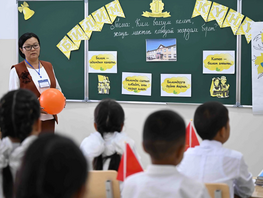Ensuring access to education for people with disabilities in Kyrgyzstan continues to be a significant challenge. The Ombudsman’s report «On the State of Human and Civil Rights and Freedoms in 2024» says.
Human rights experts cite the lack of appropriate conditions in schools and higher education institutions as a key reason. Barriers range from inaccessible infrastructure to shortages of qualified teachers, educational materials, equipment, and weak practices in inclusive education.
These issues remain the main obstacles to ensuring the right to education for people with disabilities.
The study found that secondary and higher education is mostly accessible only to individuals with mild disabilities who can move independently and do not require assistance.
People with moderate or severe disabilities, even with preserved intellectual abilities, face serious barriers to education.
In the best-case scenario, such students receive home-based education. However, home schooling does not cover all children and adults with disabilities.
The report emphasizes the urgent need to modernize special schools. Without this, growing numbers of children with intellectual and multiple disabilities will face worsening educational challenges. The authors recommend opening new day schools for children with disabilities across all regions of the country.
The Cabinet of Ministers is also advised to allocate financial resources to improve the material and technical base of special schools and boarding schools for children with disabilities. This includes developing textbooks and programs in Russian and Kyrgyz, equipping labor training and therapeutic physical education rooms, improving infrastructure, enhancing teacher qualifications and salaries, and addressing other needs.
Additionally, the report proposes creating a comprehensive commission to review the work of the Psychological-Medical-Pedagogical Commission (PMPC) responsible for placing children in specialized schools and boarding schools.
According to the National Statistical Committee, more than 37,600 children with disabilities live in Kyrgyzstan. About 7,700 of them remain outside the education system due to administrative, infrastructural, and medical barriers.






